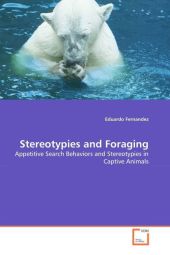 Neuerscheinungen 2010Stand: 2020-01-07 |
Schnellsuche
ISBN/Stichwort/Autor
|
Herderstraße 10
10625 Berlin
Tel.: 030 315 714 16
Fax 030 315 714 14
info@buchspektrum.de |

Eduardo Fernandez
Stereotypies and Foraging
Appetitive Search Behaviors and Stereotypies in Captive Animals
2010. 164 S. 220 mm
Verlag/Jahr: VDM VERLAG DR. MÜLLER 2010
ISBN: 3-639-25209-8 (3639252098)
Neue ISBN: 978-3-639-25209-5 (9783639252095)
Preis und Lieferzeit: Bitte klicken
Stereotypies in captive animals have been defined as repetitive, invariant patterns of behavior that serve no obvious goal or function. Stereotypies are commonly attributed to boredom or stress, and are typically "treated" with environmental enrichment. These enrichment items often includes food presented at times other than regular feedings. This thesis applies a "foraging loop" hypothesis to the behaviors of contrasting species of marine mammal carnivores; polar bears and walruses. Polar bears in the wild spend the majority of each day traveling to locate prey; captive polar bears spend several hours a day in locomotor stereotypies preceding a large feed. In contrast, walruses in the wild graze in beds of mollusks on the ocean floor, using their flippers, vibrissae, and mouths to locate and consume mollusks. Captive walruses spend the majority of their day circle swimming, mouthing, and sucking inedible objects in their enclosure. The results of six experiments allowed us to conclude that both species´ stereotypies were attempts to forage in their captive environment, and that allowing these animals to forage in a species-typical manner effectively decreased those stereotypies.
Dr. Eduardo J. Fernandez received his PhD in Psychology from Indiana University, where he worked with the Indianapolis and Cincinnati Zoo. He has worked with over 30 species of animals, and currently runs University of Washington´s Behavioral Enrichment Animal Research (BEAR) group, which conducts welfare research at the Woodland Park Zoo.


